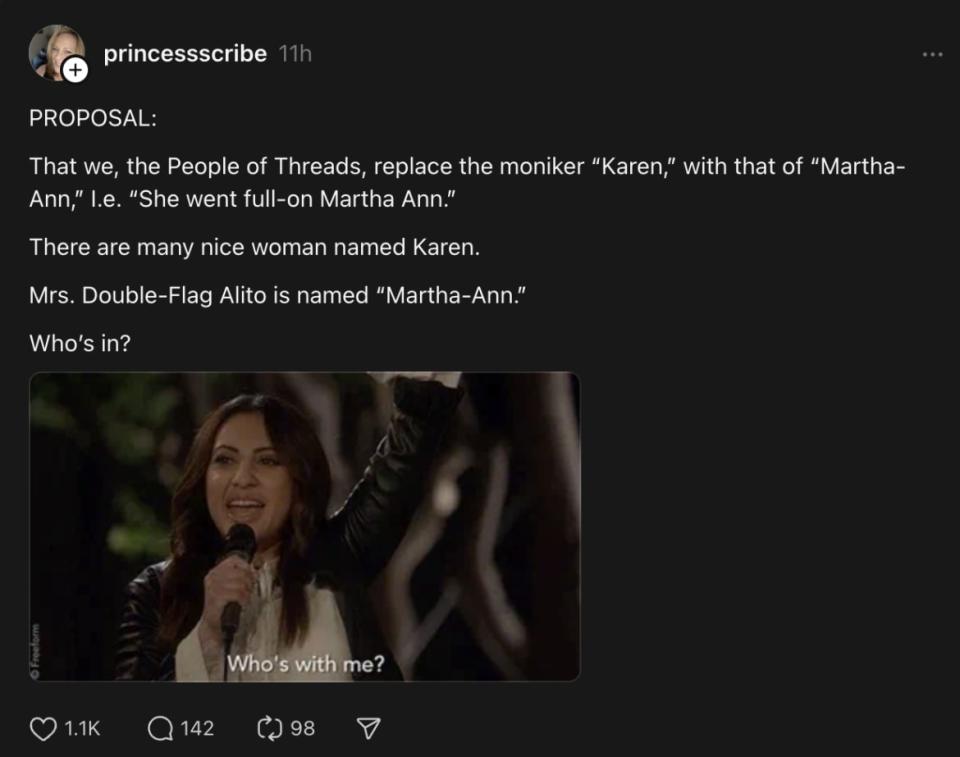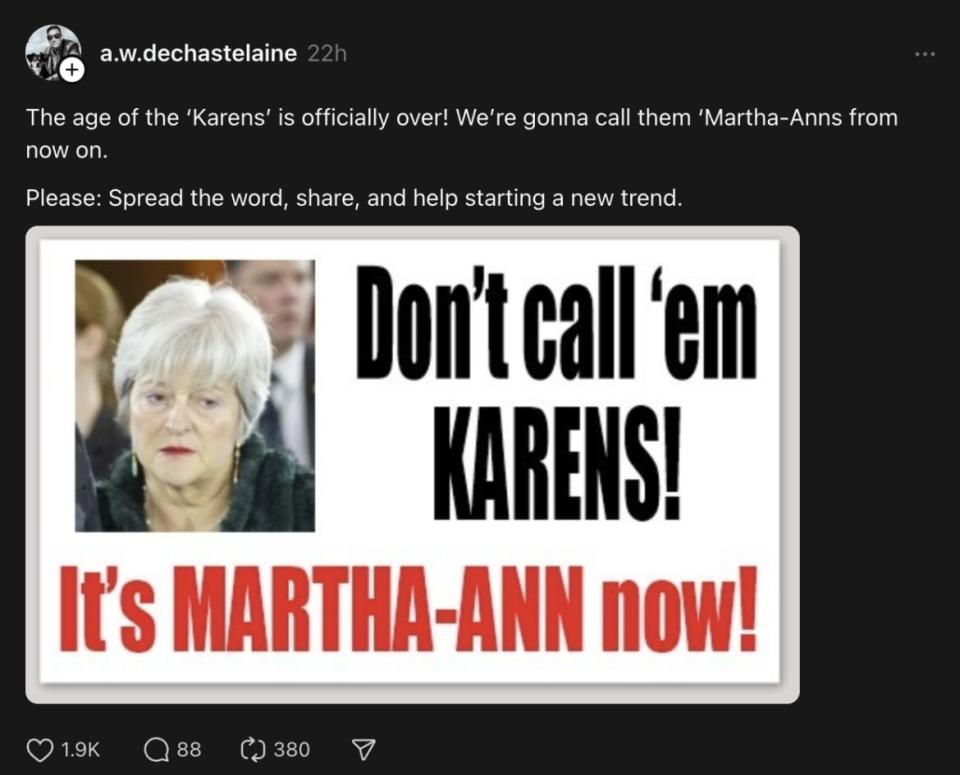Is ‘Martha-Ann’ the New ‘Karen,’ Thanks to Samuel Alito’s Wife?

Move over, Karen. Martha-Ann could take the throne.
Supreme Court Justice Samuel Alito’s wife is riling up the internet after undercover recordings exposed her rants about “feminazis” and dreams of battling her neighbor’s Pride flag with her own Christian emblem—not to mention her boasting of her German heritage and warning: “You come after me, I’m going to give it back to you.”
To some observers, Martha-Ann Alito is the ultimate “Karen,” a slang term for an entitled, sometimes racist middle-aged white woman. The moniker percolated for years before solidifying as something more sinister in 2020, thanks to a string of incidents involving white women calling the police on Black people, including a bird-watcher in Central Park.
Now a bevy of social media users are calling for “Martha-Ann” to be the new pejorative for obnoxious—and at times dangerous—white lady privilege.
“Replacing ‘Karen’ with the much less common ‘Martha-Ann’ would spare a lot of women undeserved scorn,” suggested screenwriter and Kim Possible co-creator Bob Schooley in a viral Threads post.
“Martha-Ann has outKarened all the Karens,” one person replied. Another chimed in, “I think we Karen’s [sic] would be happy to pass the torch to Martha-Ann.”
“I had this EXACT same thought today,” a third commenter wrote. “We need to give (actual) Karens a break.”
Schooley told The Daily Beast that “Karen” offenses broadcast on social media “will always get some poor Karen caught in the crossfire” and that “actual innocent Karens are harmed.”
“Martha-Ann is kind of specific,” he added. “I don’t think you’d be hitting as many people with the target.”
Across Threads, X, and Facebook, others had the same idea.
Indeed, the momentum against Martha-Ann Alito has been building since journalist Lauren Windsor released her secretly recorded conversations with the Alitos from last week’s Supreme Court Historical Society annual dinner.
All this followed revelations that the Alitos flew an upside-down American flag outside their Virginia home in January 2021, and an “Appeal to Heaven” flag, adopted by Christian nationalists and J6ers, at their New Jersey beach house. (Alito has claimed his spouse was behind both banners.)

This month, Emily Baden, a former neighbor of the Alitos, detailed how her homemade anti-Trump signs ignited the wrath of Martha-Ann.
On one occasion, Baden claimed, the Alitos dropped by when she and her husband were in the driveway, and Martha-Ann referred to them by name, despite Baden never introducing herself, and hurled expletives, calling them “fascists.”
“They’re choosing to harass and intimidate us when we are nothing to them,” Baden told NPR. “We’re just random people.”
Such neighborhood antagonism is the province of Karens.
“In acknowledgment of Mrs. Alito’s nastiness,” one person wrote on X, “we need to start using ‘Martha-Ann’ instead on [sic] ‘Karen’ as the moniker for angry white women.”
“Karens everywhere breathe a sigh of relief as Martha-Anns take the spotlight as the stereotype of bigotry,” another user noted.
Don Caldwell, editor-in-chief of the website Know Your Meme, said that at first glance the budding “Martha-Ann” movement has all the markings of a “forced meme”—or one that’s artificially concocted and promoted rather than spread organically.
“‘Karen’ itself kind of just happened,” Caldwell told The Daily Beast. “There was this bubbling up in the culture over many, many years, and then finally took a hold.”
The origins of Karen aren’t entirely clear but often traced back to a 2005 Dane Cook comedy routine “The Friend That Nobody Likes,” wherein he spouts off about every friend group having “a douchebag.” A decade later, comedian Jay Pharoah quipped during a comedy special, “It’s always a Karen.” Pharoah, in 2020, said he’s been using the joke for years.
The Karen character has also long been associated with the “Speak to the Manager” haircut meme. (Think: Kate Gosselin’s ’do in reality show Jon & Kate Plus 8.)
In recent years, the pejorative is linked to racist incidents in the news. Amy Cooper was dubbed “Central Park Karen” for calling police on birdwatcher Christian Cooper after he asked her to leash her dog; during her 911 call, Cooper claimed an “African-American” man was “recording me and threatening me and my dog.”
There was also the infamous “Soho Karen,” a California woman who falsely accused a Black teenager of stealing her phone at a New York City hotel. Miya Ponsetto initially pleaded guilty to a hate crime but it was wiped from her record after she completed counseling.
“I don’t know if we’re past peak Karen,” Caldwell said. “It’s still firmly rooted.”

But Caldwell says “Martha-Ann” could still make a dent in internet culture.
“While some people will say you can’t force a meme, I would say that’s actually not the case. Memes can be forced. It’s just hard, and it takes a lot of diligence and also a lot of people to get behind it,” Caldwell said.
“There could be legs there. Time will tell.”
On Wednesday, X users continued to push the insult.
“We need to retire/recycle the ‘Karen’ adjective (female, entitled, nasty),” one man wrote. “It’s been around a while. My suggestion for a replacement is ‘Martha-Ann.’
“The whole world knows who she is, and she’s an excellent example of the best Karen attributes. Keep it short: substitute ‘Martha.’”
Get the Daily Beast's biggest scoops and scandals delivered right to your inbox. Sign up now.
Stay informed and gain unlimited access to the Daily Beast's unmatched reporting. Subscribe now.


